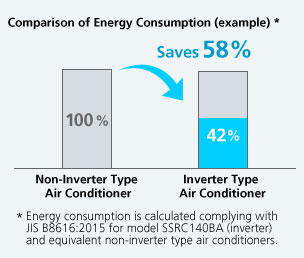A new electricity tariff was announced for consumers on Band A one month ago. For context, consumers in Nigeria are grouped based on the power they consume. Those supposed to enjoy at least 20 hours of electricity daily belong to Band A and are now paying N225 per kilowatt hour from N66. This 3.4x increase has sparked intense debate, especially after the Minister of Power, seemingly attempting to explain the rise, said Nigerians are fond of leaving their “air conditioners (ACs) and Freezers” on because electricity is “cheap”.
If you’re a Band A customer, or any band really, we believe you’re looking for ways to reduce the power you consume so you can lower your electricity bills. Air conditioners have notoriously high energy consumption, but thankfully there are inverter ACs that consume less electricity.
In this article, we’ll explore the differences between inverter and non-inverter air conditioners to help you make the right decision for your home. First, let’s break down the technology they both operate on:
- Non-Inverter Technology: Non-inverter ACs operate at a fixed speed. When the desired temperature is reached, the compressor simply shuts off entirely. As the temperature rises, the compressor kicks back in at full blast to bring the room back down to the set point. This on-off cycle repeats throughout the operation.
- Inverter Technology: Inverter ACs boast a variable-speed compressor. Instead of abruptly switching on and off, the inverter adjusts the compressor speed to precisely maintain the desired temperature. This translates to smoother operation, reduced energy consumption, and improved comfort.
Everyone asks a big question: How much power does an inverter AC help you save?
There is no accurate answer to this question. Still, the amount of power savings you can achieve with an inverter AC depends on several factors, including the unit’s efficiency, usage patterns, and local climate conditions. Studies suggest inverter ACs can save anywhere from 30% to 50% on your electricity bill compared to non-inverter ACs but Daikin claims a 58% energy savings.

Source – DAIKIN GLOBAL
While energy consumption is important when deciding between Inverter ACs and Non-inverter ACs, other factors should also inform your decision.
Pros and Cons of Inverter ACs:
Pros:
- Superior Comfort: Inverter ACs maintain a more consistent temperature, avoiding uncomfortable bursts of cool air followed by periods of rising heat that are common with non-inverters.
- Quieter Operation: Due to the smooth, variable-speed operation, inverter ACs generate less noise compared to the abrupt on/off cycles of non-inverter ACs.
- Durability: Inverter technology often translates to a longer lifespan for the compressor, potentially reducing replacement costs in the long run.
Cons:
- Higher Initial Cost: Better technology comes at a premium. The upfront cost of an inverter AC can range from N400k to N1.5m, depending on the size, compared to a non-inverter model with a similar cooling capacity that ranges from N300k to N1m.
- Complexity: The more intricate technology of inverter ACs may require specialised technicians for servicing, though this shouldn’t be a major concern for reputable brands.
Top 5 Inverter AC Brands In Nigeria
Getting the best quality from trusted brands is important if you get an inverter AC. Let’s discuss the top 5:
- PANASONIC: Panasonic has a strong presence in Nigeria and is known for the efficiency, durability, and strength of its products, including inverter ACs.
- DAIKIN: Although new, Daikin ACs are beginning to compete well with the OG brands. They are affordable and provide all the features of a typical air conditioner.
- SAMSUNG: Samsung is known for its great quality products, and inverter ACs are not exempted. They are also known to have the lowest energy consumption of all.
- SCANFROST: Their inverter ACs are considerably more cost-effective and budget-friendly. It is worth considering if you want to get an inverter AC. They are available here.
- HAIER THERMOCOOL: This OG brand is known for its quality but is relatively more expensive than others. If you understand quality and high performance, then HAIER THERMOCOOL inverter ACs are worth your investment.
Whether you’re looking to save energy, or you just want superior comfort, then inverters ACs are worth considering. Let us know in the comments below if you will be getting one for your home.
One thought on “Inverter vs. Non-Inverter Air Conditioners: What’s the difference?”